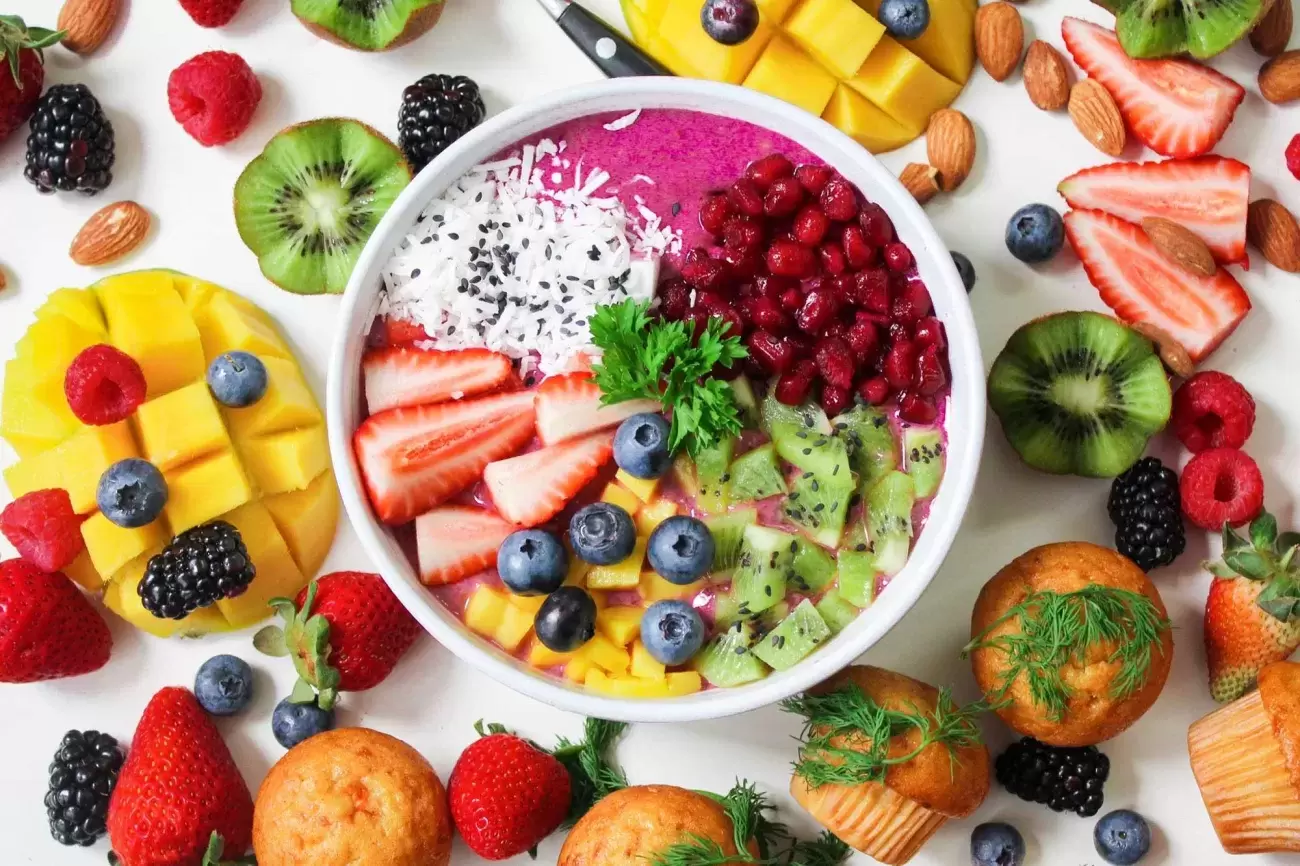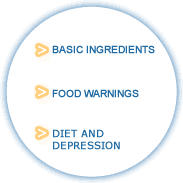Eat Well

How Healthy Eating Helps
Mom was right: You've got to eat well to function well. Just in case you didn't gobble up Mom's wisdom, here are some useful tidbits.
Among other benefits, good food can:
- boost your energy
- lower the risk of developing certain diseases
- provide fuel to your brain
- counteract the impact of stress on your body
- affect mood-related body chemicals
In an unhappy twist, good nutrition can help at times of stress, but that's exactly when lots of us tend to eat less well. According to a recent survey nearly half of Americans overeat or eat unhealthy food to cope with stress. In fact, it's not just that we're seeking creamy comfort—our stress hormones actually give us the munchies.
Still, if you follow some reasonable guidelines you may be able to reduce your stress and promote your overall health and well-being.
No one knows exactly which foods promote maximum mental health. But following some basic suggestions can boost your energy, mood and overall wellness. We can't cover all the elements of nutrition here, so we're offering a few morsels:
- Consider Uncle Sam's recipe. The U.S. Department of Agriculture, which builds the food pyramid, says a healthy diet
- emphasizes fruits, vegetables, whole grains and fat-free or low-fat dairy products
- includes lean meats, poultry, fish, beans, eggs and nuts
- is low in saturated fats, trans fats, cholesterol, salt and added sugars
- Don't skip meals. Eating consistently throughout the day provides your brain and body with a steady supply of fuel. It also prevents your blood sugar from dropping, which can cause nervousness, irritability and other problems.
- Snack well. Sustain your energy—and your ability to resist the vending machine—by packing healthy snacks. Try to keep some nuts, whole or dried fruit or other portable food in your bag or backpack.
- Work on your balance. Maybe you know that your body needs a varied diet. But have you thought about your brain? Your brain needs a healthy supply of carbohydrates, fats and proteins, or it can't perform functions that affect your mood and thinking.
- Don't over-diet. Eat to be healthy and fit—not to fit into a certain pair of jeans. Strict food rules usually backfire, and excessive dieting can be dangerous. If you or someone you know seems at risk of an eating disorder, professional counseling can help.
For additional nutritional information, see mypyramid.gov. You'll find a food tracker, menu planner and other tools.
Some foods just pack on pounds and bring no nutrition to the table. Others can deflate your mood or wreck your sleep. Still, you probably don't have to give up all your goodies. Take a look at a few cautions:
- Be carb smart. Carbohydrates can boost the body chemical serotonin, creating a relaxed feeling. But sweets and other refined carbs can cause your blood sugar to rise and drop, ultimately resulting in a loss of energy. To stay steady, pick carbs that enter your blood slowly and evenly, like whole-grain breads, fruits and veggies.
- Reduce saturated fat and cholesterol. Your brain needs a strong blood supply to function well. Saturated fats and cholesterol can narrow your blood vessels, so watch out for too much red meat, egg yolks, butter and whole milk. Look for healthy fats like the ones found in fish, avocados, olive oil and nuts.
- Limit alcohol. If you're stressed out, alcohol may seem to offer relief. However, it actually adds stress to your body and cause problems like disturbed sleep and poor judgment.
- Cut back on caffeine. Caffeine is a stimulant, so it can make you nervous and restless. A cup of coffee can also wreck your sleep—even if you drink it hours before bed. Caffeine also may worsen depression. If you've been imbibing a lot, cut back slowly or you'll risk withdrawal.
Some evidence links depression and nutrition, though some of the research is still under debate. Nutrients that may play a role in combating depression include:
- Vitamin B-12 and folate. Good sources of B-12 are fish like salmon and trout and fortified breakfast cereals. Folate is found in dark leafy vegetables, almonds, dairy and fortified whole-grain breakfast cereals.
- Omega-3 fatty acids. The best sources of omega-3 fatty acids are fatty fish like salmon, catfish and trout. Other sources include ground flaxseeds, walnuts and omega-3 fortified eggs.
If you're feeling depressed, diet alone is likely not the answer. Consider contacting a mental health professional.
Reviewed by Susan Bowerman, MS, CSSD, a registered dietitian and lecturer in the Department of Food Science and Nutrition at California Polytechnic State University, San Luis Obispo.
Healthy diet: Eating with mental health in mind
You’ve probably heard the expression, “you are what you eat,” but what exactly does that mean? Put simply, food is fuel, and the kinds of foods and drinks you consume determine the types of nutrients in your system and impact how well your mind and body are able to function.
Avoid: Sugary drinks and excessive amounts of caffeine. Sugary drinks have empty calories and damage tooth enamel. Caffeine should also be avoided in excess, as it can trigger panic attacks in people who have anxiety disorders.0
Try to: Drink at least 8 glasses of water a day (about 2 liters) to prevent dehydration. Studies show that even mild dehydration can cause fatigue, difficulty concentrating, and mood changes1, in addition to physical effects like thirst, decreased or dark urine, dry skin, headache, dizziness and/or constipation. Limit caffeine if you have an anxiety disorder. If you feel like you need some caffeine, try tea. Tea has lower amounts of caffeine than coffee and has lots of antioxidants-chemicals found in plants that protect body tissues and prevent cell damage.
Avoid: Skipping breakfast. Breakfast is needed to fuel your body (including your brain) after going without food during sleep and also jump starts your metabolism for the day. Skipping meals leads to fatigue and feelings of “brain fog.”
Try to: Incorporate a healthy breakfast into your routine. If you’re tight on time in the mornings, grab a whole grain granola bar, yogurt and a piece of fruit to get you off to a good start.
Avoid: High-fat dairy, and fried, refined and sugary foods, which have little nutritional value. In addition to contributing to weight gain, and conditions like diabetes, research shows that a diet that consists primarily of these kinds of foods significantly increases risk of depression.2
Try to: Eat a diet that relies on fruits, vegetables, nuts, whole grains, fish and unsaturated fats (like olive oil). People who follow this kind of diet are up to 30% less likely to develop depression than people who eat lots of meat and dairy products.3
Tips for the grocery store
- Try to concentrate your shopping on the perimeter of the grocery store where the fresh, refrigerated and frozen foods are, rather than in the center aisles where foods like chips, cookies and candy can be tempting.
- If fresh veggies tend to expire before you get a chance to eat them, buy frozen ones instead. Stores carry an assortment of steam-in-bag vegetables that keep well in the freezer and cook in the microwave in a matter of minutes.
- Choose whole grain pastas, breads, cereals, granola bars and snacks instead of those made with white flour. Whole grains are a good source of fiber, which promotes digestive health, and also provide folate (or folic acid).
Mind and body boosting nutrients
Increased intake of folate is associated with a lower risk of depression.4
Folate is especially important for pregnant women, but everyone needs folic acid for production of cells. It is especially important for healthy hair, skin, nails, eyes, liver and red blood cell production.
Leafy green vegetables like spinach and kale, fruits, nuts, beans and whole grains have high amounts of folate, or folic acid.
Rates of depression are higher in people with Vitamin D deficiency compared to people who have adequate levels of vitamin D.5 Lack of Vitamin D is thought to play a role in Seasonal Affective Disorder, which is depression that commonly starts in the fall, lasts through winter and subsides in the sunnier spring and summer months.
Vitamin D is needed to help the body absorb calcium for strong teeth and bones, and the health of muscles and the immune system. Vitamin D deficiency is associated with heart disease and increased risk of heart attacks.6
Most foods do not naturally have Vitamin D, but many are “Vitamin D fortified.” Fatty fish like salmon and tuna have the most naturally occurring Vitamin D. Other foods like milk, orange juice and breakfast cereals have Vitamin D added.
Our bodies also produce Vitamin D as a result of being in the sun. Five to thirty minutes of sun exposure twice a week generally produces enough Vitamin D, with lighter-skinned people requiring less time than those with darker skin.7 Time in the sun beyond the suggested amounts above requires use of sunscreen to prevent skin damage and reduce risk of skin cancer. Vitamin D supplements may be used in fall and winter months.
Some studies suggest that omega-3s may be helpful in the treatment of depression and seem to have a mood-stabilizing effect. Omega-3 essential fatty acids may also help boost the effectiveness of conventional antidepressants and help young people with ADHD.
Omega-3 fatty acids are thought to be important in reducing inflammation, the primary cause of conditions like arthritis and asthma, and play a role in heart health by reducing triglycerides (blood fats). They may also reduce risk for certain kinds of cancer.8
Oily fish (salmon, trout, mackerel, anchovies and sardines) are the most highly recommended sources of omega-3 fatty acids, and the American Heart Association suggests eating these types of fish at least twice a week. Omega-3s can also be found in walnuts, flax (or flaxseed oil), olive oil, fresh basil and dark green leafy vegetables.
0 Nardi AE, Valenca AM, Nascimento I, Freire RC, Veras AB, de-Melo-Neto VL, et al. A caffeine challenge test in panic disorder patients, their healthy first-degree relatives, and healthy controls. Depress Anxiety. 2008;25(10):847-53
1Nauert, R. (2012). Dehydration Influences Mood, Cognition. Psych Central. Retrieved on March 12, 2014, from http://psychcentral.com/news/2012/02/20/dehydration-influences-mood-cognition/35037.html
2Akbaraly TN, Brunner EJ, Ferrie JE, Marmot MG, Kivimaki M, Singh-Manoux A. Dietary pattern and depressive symptoms in middle age. Br J Psychiatry. 2009;195:408-413.
3Sánchez-Villegas A, Delgado-Rodríguez M, Alonso A, et al. Association of the Mediterranean dietary pattern with the incidence of depression: the Seguimiento Universidad de Navarra/University of Navarra follow-up (SUN) cohort. Arch Gen Psychiatry. 2009;66:1090-1098.
4University of Eastern Finland. (2013, September 16). Diet is associated with risk of depression. ScienceDaily. Retrieved March 5, 2014 from www.sciencedaily.com/releases/2013/09/130916103530.htm
5Anglin R, Samaan Z, Walter S et al. Vitamin D deficiency and depression in adults: systematic review and meta-analysis. British Journal of Psychiatry, 2013.
6Giovannucci E, Liu Y, Hollis BW, Rimm EB. 25-Hydroxyvitamin D and Risk of Myocardial Infarction in Men: A Prospective Study. Arch Intern Med. 2008;168(11):1174-1180. doi:10.1001/archinte.168.11.1174.
7Holick MF. Vitamin D deficiency. N Engl J Med 2007;357:266-81.
8http://umm.edu/health/medical/altmed/supplement/omega3-fatty-acids



